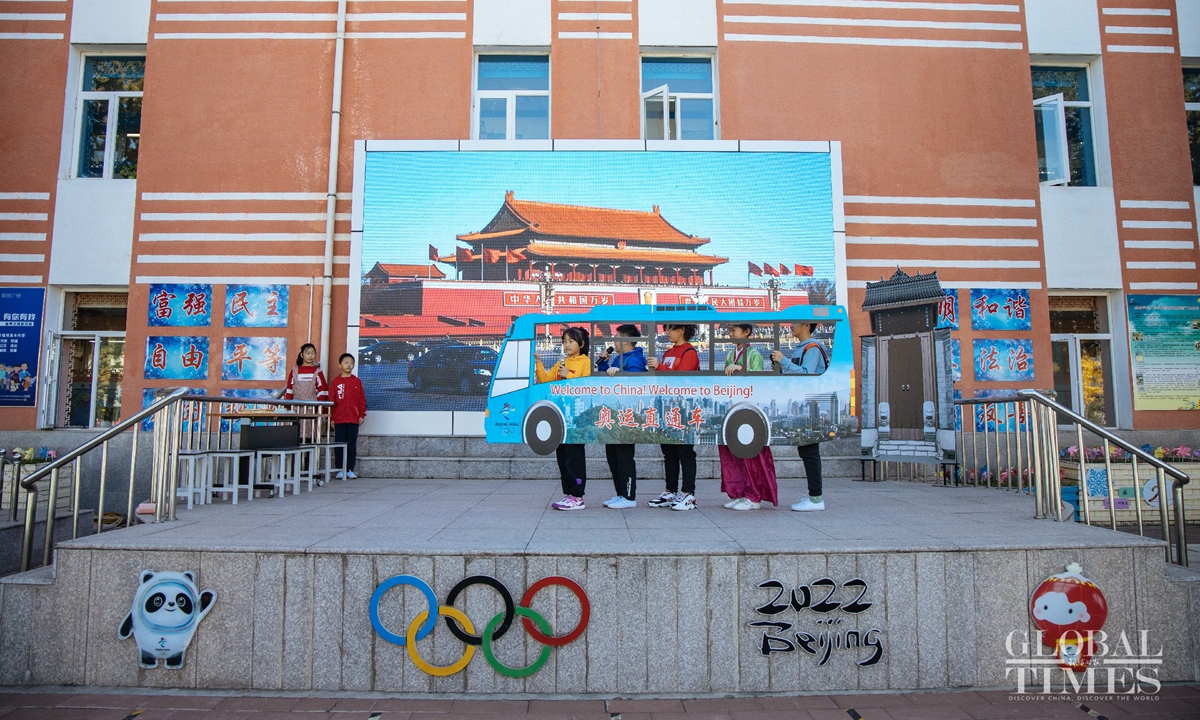
Students play winter sports to celebrate upcoming 2022 Beijing Winter Olympics Photo:Li Hao/GT
Statements from various departments exhibit full preparation for and confidence in the upcoming Beijing Winter Olympics, as authorities in civil aviation, public security and broadcasting, and teams for snowmaking and meteorology said they are fully prepared.
The Global Times learned from the Civil Aviation Administration of China (CAAC) on Wednesday that Beijing Capital International Airport will be the only official port of entry for the 2022 Winter Olympics and Paralympics.
The airport will use T3-D independent closed terminals as entry channels for international arrivals, and T3-C and T3-E terminals for international departures with closed-loop management, Sun Jianying, an official from the Beijing Organizing Committee for the 2022 Olympic and Paralympic Winter Games, said on Wednesday.
From October 3 to November 9, a total of 85 flights related to the Olympics were processed with high efficiency and tight closed-loop control, data from the CAAC showed.
The Beijing Municipal Public Security Bureau said on Tuesday that the security work for the Winter Olympics has entered the competition stage.
Some of the venues for the Beijing Winter Olympics are conducting test events and taking on other events. Since October 4, the security team at the National Sliding Center has entered closed-loop management for security work, with staff manning their posts 24 hours a day and conducting daily safety checks.
"We use the test events as a practice ground for Winter Olympic Games security and work, according to the standards and requirements of the Games," an officer from the Beijing Municipal Public Security Bureau said.
The snowmaking team, the most important supporting team for snow sports, will use high technology to produce high-quality and environmentally friendly snow for the Games.
Through numerous tests, the Beijing Winter Olympics snowmaking team established the territorial parameters of the Yanqing and Zhangjiakou competition areas to create "ice-like snow" adapted to the characteristics of Beijing's continental monsoon climate.
In order to cope with possible extreme weather, the team experimented with early snowmaking, which is to make and store snow beforehand in low temperatures and use it in the following winter.
Meteorological security is another field that the organizing committee has stressed, Wang Gengchen, head of the research team for the Beijing Winter Olympics' meteorological security, told the Global Times on Wednesday.
Since the venues of the Beijing Winter Olympics are scattered and some of them are located in the mountains, there is a big challenge to weather forecasting, Wang said.
"The Beijing Winter Olympics has set up an experts' team specializing in meteorology, which is strictly adopting different forecasting strategies for different venues to guarantee meteorological security refinement.
"Currently, the meteorological security experts' team has conducted several batches of drills and has been on standby."
In late October, China Central Television (CCTV) launched a new channel, CCTV-16, which is specially dedicated to Olympics-related programs, including live broadcasts.
As of November 7, the channel had a cumulative audience of over 56.43 million viewers, and it is available in all 31 provincial-level regions in the Chinese mainland, covering nearly 300 million subscribers.
In terms of broadcasting, the channel uses advanced 5G, 8K and artificial intelligence technologies. Currently, it broadcasts other special quality programs, as well as social and cultural activities to warm up for the Winter Olympics.
China's State Language Commission has created the world's largest multilingual terminology corpus for the Winter Olympics, covering eight languages and including every term related to the competition events of the Beijing Winter Olympics and Paralympics, the first of its kind in the history of language services for the Winter Olympics.
The Beijing Winter Olympics will take place from February 4-20, 2022 in Beijing, its Yanqing district, and neighboring Zhangjiakou in Hebei Province.




